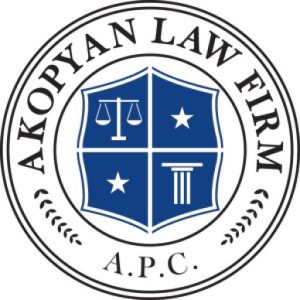Alhambra Employment Lawyers
The Akopyan Law Firm A.P.C. stands ready to fight for the rights of workers in Alhambra dealing with discrimination, harassment, retaliation, wrongful termination, or other illegal conduct in the workplace. The firm also stands ready to provide small businesses in Alhambra economical and efficient solutions to problems involving employment law. Our substantial experience in approaching employment disputes from both sides gives us rare insight into the mindset of the opponent, which truly goes a long way to achieving the best possible outcome.
About Alhambra, California
 Alhambra is a City in the County of Los Angeles, which is located in the San Gabriel Valley east of downtown Los Angeles. Alhambra is home to more than 90,000 residents. Alhambra covers almost eight square miles and encompasses the following zip codes: 91801, 91903, and 91804. The San Gabriel Mission was founded nearby on September 8, 1771, as part of the Spanish conquest and occupation of Alta California. In 1820 Mexico won its independence from the Spanish crown and lands once ruled by them became part of the Mexican Republic. These lands then transferred into the hands of the United States following Mexico’s defeat in the Mexican–American War. A wealthy developer, Benjamin Davis Wilson, married Ramona Yorba, daughter of Bernardo Yorba, who owned the land which would become Alhambra. With the persuasion of his daughter, Ruth, Yorba named the land after a book she was reading, Washington Irving’s Tales of the Alhambra. Alhambra was founded as a suburb of Los Angeles that remained an unincorporated area during the mid-19th century. On July 11, 1903, the City of Alhambra was incorporated. Alhambra is promoted as a “city of homes”, and many of its homes have historical significance. They include styles such as craftsman, bungalow, Spanish Mediterranean, Spanish colonial, Italian beaux-arts, and arts and crafts.
Alhambra is a City in the County of Los Angeles, which is located in the San Gabriel Valley east of downtown Los Angeles. Alhambra is home to more than 90,000 residents. Alhambra covers almost eight square miles and encompasses the following zip codes: 91801, 91903, and 91804. The San Gabriel Mission was founded nearby on September 8, 1771, as part of the Spanish conquest and occupation of Alta California. In 1820 Mexico won its independence from the Spanish crown and lands once ruled by them became part of the Mexican Republic. These lands then transferred into the hands of the United States following Mexico’s defeat in the Mexican–American War. A wealthy developer, Benjamin Davis Wilson, married Ramona Yorba, daughter of Bernardo Yorba, who owned the land which would become Alhambra. With the persuasion of his daughter, Ruth, Yorba named the land after a book she was reading, Washington Irving’s Tales of the Alhambra. Alhambra was founded as a suburb of Los Angeles that remained an unincorporated area during the mid-19th century. On July 11, 1903, the City of Alhambra was incorporated. Alhambra is promoted as a “city of homes”, and many of its homes have historical significance. They include styles such as craftsman, bungalow, Spanish Mediterranean, Spanish colonial, Italian beaux-arts, and arts and crafts.
Alhambra’s main business district, at the intersection of Main and Garfield, has been a center of commerce since 1895. By the 1950s, it had taken on an upscale look and was “the” place to go in the San Gabriel Valley. While many of the classic historical buildings have been torn down over the years, the rebuilding of Main Street has led to numerous dining, retail, and entertainment establishments. Alhambra has experienced waves of new immigrants, beginning with Italians in the 1950s, Mexicans in the 1960s, and Chinese in the 1980s. As a result, a very active Chinese business district has developed on Valley Boulevard, including Chinese supermarkets, restaurants, shops, banks, realtors, and medical offices. The Valley Boulevard corridor has become a national hub for many Asian-owned bank headquarters, and there are other nationally recognized retailers in the city. The Akopyan Law Firm A.P.C. is headquartered in Los Angeles which is minutes away from Alhambra. Thus, our lawyers stand ready to serve employees and employers in Alhambra with all their employment law needs.
The Best Alhambra Employment Attorneys Are A Phone Call Away
Finding the right labor lawyer in Alhambra is not always easy. There are many different firms to choose from but the approach of each firm varies significantly. Not every employee attorney in Alhambra will be a good fit for every case. Some employment lawyers may prefer a quick and easy low value settlement over a big drawn-out fight which can eventually lead to a full value resolution. An internet search for “Alhambra employment lawyer” or “wrongful termination attorney in Alhambra” will likely produce paid advertisements from tons of lawyers who would be happy to take the easy approach. The goal of the Alhambra, California labor lawyers at the Akopyan Law Firm is to achieve the best possible outcome for each client regardless of how big of a fight it would take to get there. Our commitment to performing quality work on every case requires us to limit our practice to a certain number of cases, but every employee who becomes our client is treated like family. We are proud of the first class personal service we provide, but we do not want you to take our word for it – See what our clients have to say! The relationships we build with our clients often outlast the life of the case. Our Alhambra employment lawyers fight passionately for our clients as confirmed by the excellent results they have achieved. If you are looking for employment lawyers in Alhambra, call us today for a complimentary case evaluation.
We Stand Ready To Fight For Alhambra Residents In Matters Which Involve:
Featured Article:
Pregnancy Disability Leave Coverage in California: What “Covered Employer” and “Eligible Employee” Mean for Workers in Physically Demanding Roles
📌 Key Takeaways Pregnancy Disability Leave (PDL) in California can affect whether an employee keeps their position while complying with pregnancy-related medical restrictions. Coverage affects protection. PDL protections generally depend on whether the employer is a covered employer and whether the employee is disabled by pregnancy, childbirth, or a related medical condition. Many “small” employers are covered. Employers with five or more employees are covered under California’s Fair Employment and Housing Act (FEHA), even when the workforce is spread across shifts, sites, or related operations. Eligibility focuses on disability status, not tenure. PDL eligibility generally depends on a health care provider’s certification that pregnancy-related conditions make job duties unsafe, not length of service. Timing and patterns can matter. Coverage disputes followed by write-ups, schedule cuts, or job loss after pregnancy-related leave or accommodation requests may raise potential pregnancy discrimination, disability discrimination, or retaliation concerns under California law. ~ ~ ~ ~ ~ ~ ~ ~ ~ ~ ~ ~ ~ ~ ~ ~ ~ ~ For many employees in physically demanding roles in California—such as warehouse, construction, retail, and delivery work—Pregnancy Disability Leave (PDL) coverage can affect whether they can follow pregnancy-related medical restrictions without losing their job. When a health care provider determines that pregnancy, childbirth, or a related medical condition makes work unsafe or unworkable, the employer’s handling of coverage and eligibility can shape what happens next. Under California’s PDL rules, protections often turn on two issues: (1) whether the employer is a covered employer, and (2) whether the employee is disabled by pregnancy, childbirth, or a related medical condition. These terms may sound technical, but they often show up through everyday workplace decisions—how schedules are assigned, how restrictions are handled, and whether the employer treats leave or accommodations as protected. Why PDL Coverage Matters When Job Security Is at Stake When pregnancy affects an employee’s ability to perform a physically demanding job, PDL coverage concerns whether the employee can take job-protected leave during a medically recognized disability period. Under California’s Pregnancy Disability Leave Law (PDLL), employees who are disabled by pregnancy, childbirth, or related medical conditions are entitled to up to four months of job-protected leave per pregnancy. This leave is available for the duration of the actual disability. [2 CCR § 11042]. PDL is separate from, and may be taken in addition to, the 12 weeks of bonding leave under the California Family Rights Act (CFRA), if the employee meets CFRA eligibility requirements. [Cal. Gov. Code § 12945.2]. Because these laws can overlap, mislabeling leave or misunderstanding eligibility can create avoidable disputes. In physically demanding jobs, restrictions like lifting limits, bed rest, reduced standing, or time away for prenatal care may conflict with strict schedules and production expectations. If an employer misunderstands or misapplies PDL coverage, an employee may feel pressured to choose between complying with medical advice and maintaining income. PDL also matters because it is closely tied to job restoration. In general, PDL protections focus on maintaining the employee’s position (or a comparable... Read more









Millions of Dollars Recovered For Our Clients
Check Out Our Case Results



